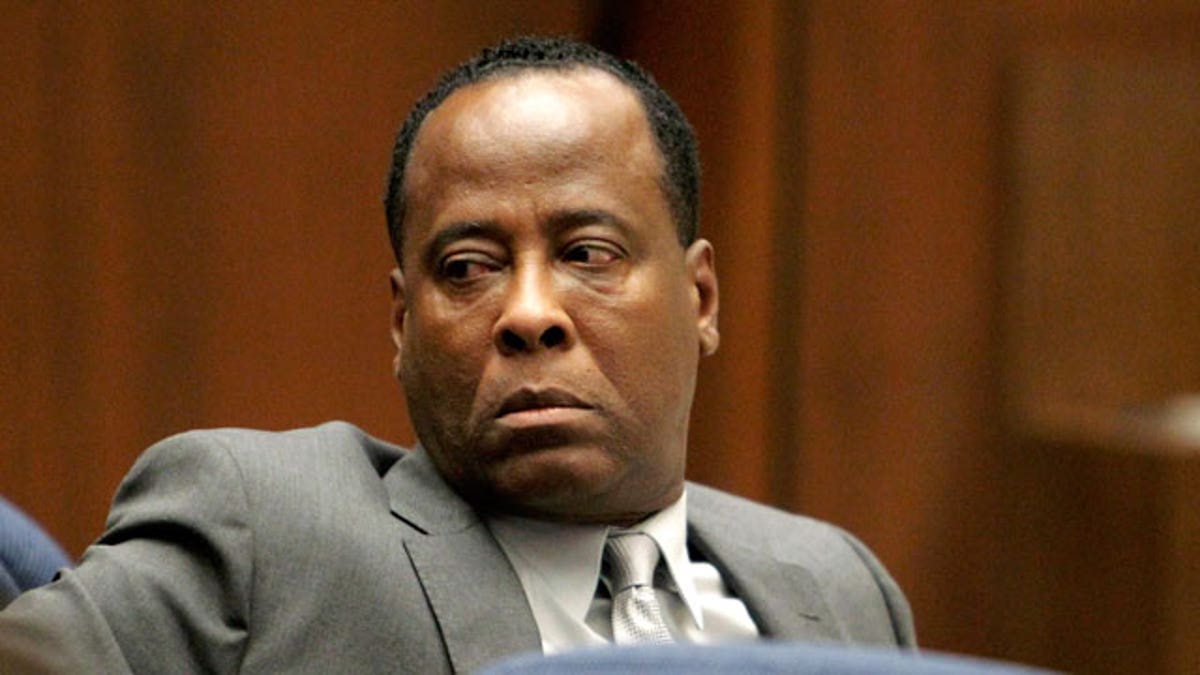
Oct. 20, 2011: Dr. Conrad Murray looks on during his involuntary manslaughter trial in Los Angeles. (AP)
Defense attorneys for the doctor charged in Michael Jackson's death are expected to begin calling witnesses in their case Monday after they finish grilling a key prosecution expert.
The defense case will be Dr. Conrad Murray's opportunity to counter four weeks of damaging testimony about him from 33 prosecution witnesses who have cast him as an inept, distracted and opportunistic doctor who repeatedly broke legal, ethical and professional guidelines.
The defense case is expected to comprise 15 witnesses, although Murray's attorneys have not publicly revealed whether they will call the Houston-based cardiologist to testify on his own behalf. Jurors have heard from the doctor through a more than two-hour interview with police, and it seems unlikely that Murray's attorneys would subject their client to what would be blistering questioning from prosecutors.
Monday will begin with lead defense attorney Ed Chernoff questioning Dr. Steven Shafer, the prosecution's final witness and an expert in the anesthetic propofol, which Murray had been giving Jackson as a sleep aid. Chernoff's questioning on Friday challenged Shafer's conclusions and comments he had made about colleague Dr. Paul White, who will testify for the defense team.
So far, Shafer has not retreated from his position that Murray is solely responsible for Jackson's death and that the cardiologist committed 17 egregious violations of medical practices that each could have either led to Jackson's serious injury or death.
After Shafer is done testifying, Murray's attorneys will likely ask a judge to dismiss the involuntary manslaughter case against the cardiologist. Superior Court Judge Michael Pastor will rule on the oral motion immediately and if he rejects it, the defense case will begin.
Defense attorneys have said they will call police detectives whom prosecutors did not call, several character witnesses, White and possibly other experts. They expect their case will last through Thursday.
Murray has pleaded not guilty, and faces up to four years behind bars and the loss of his medical license if convicted.
The defense will have its work cut out to try to sway jurors to acquit Murray.
"He will have to change the landscape here and show some reasonable doubt, said Marcellus McRae, a former federal prosecutor and trial attorney who has been following the case closely. "The question is will this be enough."
McRae said calling Shafer as the prosecution's final witness was a master stroke.
"Brick by evidentiary brick, Shafer has built a wall of scientific reasons for the jury to conclude that Dr. Murray was criminally negligent," he said. "It allows the prosecution to tell the jury that their case is built on science rather than shifting theories."
Out of sight of the jury, the defense's theory has shifted in recent months from arguing that Jackson swallowed propofol and gave himself the fatal dose and more recently that the singer had swallowed several pills of the sedative lorazepam, which led to his death.
They may also argue that Jackson somehow gave himself a shot of propofol after Murray left the room, killing him quickly.
Prosecutors have sought to discredit all those theories through Shafer, who himself drank propofol before the trial in an attempt to confirm that it wouldn't induce sedation or other ill effects. He called the amount of lorazepam in Jackson's stomach "trivial" and last week said the only possible explanation for Jackson's death based on the evidence was that Murray put the singer on an IV drip of propofol and left the room after the singer appeared to be asleep.
This week, it will be the defense's turn to either offer alternative theories or somehow pick apart the prosecution's case.






